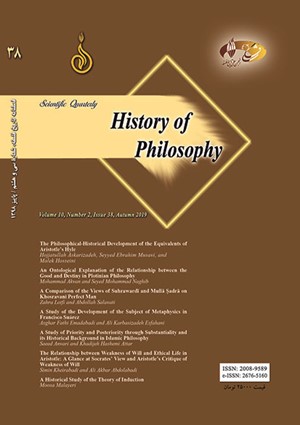-
-
List of Articles
-
Open Access Article
1 - The Relationship between Weakness of Will and Ethical Life in Aristotle: A Glance at Socrates’ View and Aristotle’s Critique of Weakness of Will
Simin Kheirabadi Ali Akbar Abdol Abadi -
Open Access Article
2 - An Ontological Explanation of the Relationship between the Good and Destiny in Plotinian Philosophy
Seyed Mohammad Naghib Mohammad Akvan -
Open Access Article
3 - The Philosophical-Historical Development of the Equivalents of Aristotle’s Hyle
Hojjatullah Askarizadeh Seyyed Ebrahim Musavi Malek Hosseini -
Open Access Article
4 - A Study of the Development of the Subject of Metaphysics in Francisco Suárez
Asghar Fathi Emadabadi Ali Karbasizadeh Isfahani -
Open Access Article
5 - A Study of Priority and Posteriority through Substantiality and its Historical Background in Islamic Philosophy
Saeed Anvari Khadijeh Hashemi Attar -
Open Access Article
6 - A Historical Study of the Theory of Induction
Moosa Malayeri -
Open Access Article
7 - Editor's Note
Hossein Kalbasi Ashtari -
Open Access Article
8 - A Comparison of the Views of Suhrawardī and Mullā Ṣadrā on Khosravani Perfect Man
Zahra Lotfi’ Abdollah Salavati
-
The rights to this website are owned by the Raimag Press Management System.
Copyright © 2017-2026







